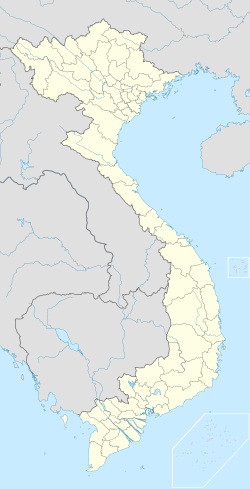Camp Evans is a former U.S. Army and U.S. Marine Corps base northwest of Huế in central Vietnam.
| Camp Evans (Camp Evans Airfield) | |||||||
|---|---|---|---|---|---|---|---|
| Huế, Thừa Thiên–Huế Province in Vietnam | |||||||
 C-130 capable airfield under construction, 17 March 1968 | |||||||
| Coordinates | 16°33′43″N 107°22′48″E / 16.562°N 107.38°E | ||||||
| Type | Army/Marine Base | ||||||
| Site information | |||||||
| Operator | Army of the Republic of Vietnam (ARVN) United States Marine Corps (USMC) United States Army (U.S. Army) | ||||||
| Condition | Abandoned | ||||||
| Site history | |||||||
| Built | 1966 | ||||||
| Built by | 8th Engineer Battalion | ||||||
| In use | 1966-1975 | ||||||
| Battles/wars | Vietnam War | ||||||
| Garrison information | |||||||
| Garrison | 1st Cavalry Division (Airmobile) 1st Brigade, 101st Airborne Division | ||||||
| Airfield information | |||||||
| Elevation | 63 feet (19 m) AMSL | ||||||
| |||||||
History
edit1966–1967
editCamp Evans was established by the 3rd Battalion, 26th Marines in late 1966 as part of Operation Chinook. The camp was located to the west of Highway 1, approximately 24 km northwest of Huế in Thừa Thiên–Huế Province. The camp was named after Marine Lance Corporal Paul Evans who was killed during Operation Chinook.[1][2]
Marine units based at Camp Evans during this period included:
1968
editIn January 1968 Camp Evans was taken over by the 1st Cavalry Division (Airmobile).[3]
On the night of 19 May 1968 the ammunition dump at Camp Evans was hit by People's Army of Vietnam (PAVN) rockets and exploded causing a chain reaction and fire that lasted more than 12 hours and damaged or destroyed 124 aircraft rendering the 1st Brigade, 1st Cavalry Division combat ineffective for a week until replacement aircraft arrived.[4]
On 3 October 1968 a USAF C-7 Caribou (#63-9753) that had just taken off from the Camp Evans airstrip collided with a 1st Cavalry Boeing CH-47 Chinook (#66-19041) resulting in the death of all 24 passengers and crew on both aircraft.[5]
1969–1972
editCamp Evans was taken over by 1st Brigade, 101st Airborne Division.[2]
Army units based at Camp Evans during this period included:
- 158th Assault Helicopter Battalion
- 3rd Battalion, 187th Infantry Regiment
- 2nd Battalion, 94th Artillery Regiment (November 1969 – 1970)[3]: 108
- 18th Surgical Hospital (March–December 1969)[3]: 215
- 63rd Signal Battalion (March 1970 – January 1972)[3]: 186
- C Battery, 4th Battalion, 77th Artillery (Aerial Rocket Artillery), 101st Airborne Division (Airmobile)[6]
- 101st Military Police, Third Platoon.
The 20th Tactical Air Support Squadron used Camp Evans as a forward operating base.[7]
Current use
editThe base is abandoned and turned over to farmland.
References
edit- ^ Wiknik, Arthur (2009). Nam Sense. Casemate Publishers. p. 8. ISBN 9781935149675.
- ^ a b Kelley, Michael (2002). Where we were in Vietnam. Hellgate Press. p. 5-174. ISBN 978-1555716257.
- ^ a b c d Stanton, Shelby (2003). Vietnam Order of Battle. Stackpole Books. p. 340. ISBN 9780811700719.
- ^ Villard, Erik (2017). United States Army in Vietnam Combat Operations Staying the Course October 1967 to September 1968. Center of Military History United States Army. p. 539. ISBN 9780160942808. This article incorporates text from this source, which is in the public domain.
- ^ "de Havilland C-7B Caribou". Aviation Safety network. Retrieved 23 October 2014.
- ^ "77th Aerial Rocket Artillery Unit". Vietnam Helicopter Pilots Association. Retrieved 4 November 2018.
- ^ "The US Air Force at Camp Evans". Archived from the original on 17 November 2014. Retrieved 22 October 2014.



